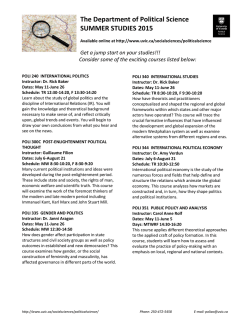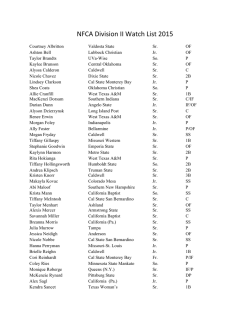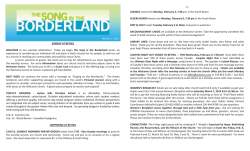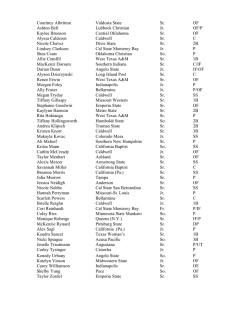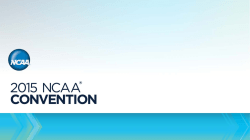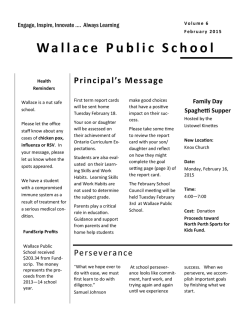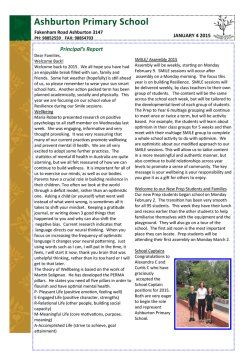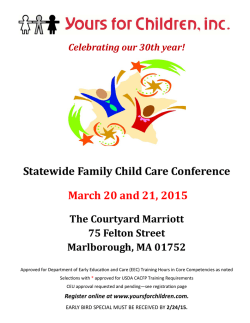
esrea 2015 milano first call
! ESREA – European Society for Research on the Educa6on of Adults Life History and Biography Network Can telling, listening to and interpre6ng stories make any real difference in a troubled and troubling world? If so, where, when and how? Life-‐based and art-‐based research: exploring their collec6ve, social and poli6cal poten6al ! The Annual Conference in 2015 will be held in Italy at Università di Milano Bicocca From Thursday 5th to Sunday 8th March 2015 The Network First Call for Papers A#er its first mee+ng in Geneva, in 1993, the Life History and Biography Network of ESREA has been a forum for a wide range of researchers, including doctoral students, drawing on different disciplinary backgrounds, and coming from every corner of Europe, and beyond. Life history and biographical approaches in adult educa+on and lifelong learning are very diverse, and our conferences are based on recogni+on and celebra+on of this diversity; we have sought to create spaces for dialogue, demonstra+on, reflexivity and discovery. In 21 years, the Network has provided the basis for diverse and influen+al publica+ons, as well as for major collabora+ve research projects and many other forms of collabora+on. Our last conferences have explored areas of research and prac+ce in life history and auto/biography: such as the role of wisdom, of the emo+ons, of the embodied nature of learning and narra+ves, of the meaning of words, of interdisciplinary research, and of the dynamic of agency and structure as well as structura+on processes. (see ESREA’s website; also our latest book, Embodied Narratives, connecting stories bodies, cultures and ecologies, edited by Laura Formenti, Linden West and Marianne Horsdal. Available from University Press of Southern Denmark | [email protected] | www.universitypress.dk; ISBN: 978-87-7674-747-3) The conference theme During the last conference, in Magdeburg, 2014, two different topics emerged as interes+ng themes for life history and auto/biographical research: of the poli+cal role and poten+al of our work as well as the role of the arts, of literature, of poetry and music in helping us think about a troubled world. We decided to combine these and to address them in our 2015 network conference. Hence, we invite researchers and diverse scholars to join us by submi\ng proposals for papers and workshops to explore the theme of whether life-‐based narra+ve and ar+s+c ac+vity can invigorate collec+ve poli+cal and social ac+on, in such a troubled world. Of course, social and poli+cal engagement can be an aspect of adult life, and of our lives as scholars, as well as a relevant issue for adult educa+on and research. It seems par+cularly important in the present moment of rising levels of xenophobia, racism and fundamentalism. During the Magdeburg conference, some of us began new conversa+ons about the biographical origins of our own social feelings and poli+cal inclina+ons: of being ac+ve and/or a^en+ve to the social and poli+cal life of the planet, of our country/ies, ins+tu+ons, and/or groups. This might link to experience, especially during adolescence and youth. Recoun+ng our own experiences brought reflec+ons on the actual and possible role of research – namely life-‐based research – in illumina+ng processes of conscien+za+on, of building cri+cal reflexivity, alongside ac+ve par+cipa+on, community learning, and so on. This in a ‘liquid’, fragile, dangerous world where the role and nature of poli+cs is itself uncertain, democracy marginalized, and the power of neo-‐liberal assump+ons transcendent, if deeply flawed. The second topic had to do with the power of arts, and all kinds of media, including new social media, in crea+ng strong emo+ons, authen+c par+cipa+on, and spaces for reflec+on. The rela+onship among different media, and with spoken or wri^en language, seems to be a very promising field for the development of life-‐based methods of research, and more generally for qualita+ve inquiry. Stories are not only made of words, as some of our conferences have already thema+zed (Milano 2009, Vaxjo 2010, Odense 2012, Magdeburg 2014). Life-‐histories and auto/biographies seem not only able to connect science, arts, and poli+cs, but to become occasions for innova+on, for transforma+ve learning, for community and poli+cal ac+on in diverse se\ngs. Telling new stories can be deeply agen+c and poli+cal in nature. In these terms they go far beyond “pure research” -‐ or a detached view of academic research in its ivory tower -‐ to build new quali+es of space for social and individual ac+on and change. This is not always the case, of course: we want to inves+gate the condi&ons in which stories can “make a real difference” -‐ for whom and for what and on whose terms? The conference seeks to develop a sense of interconnec+vity among life-‐based and arts-‐based narra+ve research, around the poten+al for individual but also collec+ve transforma+ons that might be triggered or chronicled by research. It will also be a^en+ve to weaving into our work previous themes of our conferences: embodiment and narra+ve, cri+cal reflec+on, social change, agency. One goal of this conference is to encourage all par+cipants to reflect on their research and to ask themselves how they can integrate socio-‐poli+cal change and community engagement, alongside an interest in the human subject and the nature of learning and educa+on, at a more in+mate and individual level. Perhaps poli+cal engagement, if it is to make real difference, requires personal reflexivity and biographical awareness, if the mistakes and even tragedies of the past are to be avoided. The personal is poli+cal, and the poli+cal, perhaps, deeply personal. Some ques6ons Can narra+on – in its many forms -‐ help young or older adults to become more effec+ve leaders in community development and poli+cal ac+on? Can life-‐based research enhance the dialogue between genera+ons and produce new forms of conversa+on as well as ac+on? How could narra+ve research foster human commitment to coopera+ve ac+on and inquiry, and to social as well as poli+cal learning? What is the role of narra+on in developing a New Civics? Our Scien6fic CommiXee Laura Formen+, Linden West (conveners of the Network) Michel Alhadeff-‐Jones, Jean-‐Michel Baudouin, Agnieszka Bron, Be\na Dausien, Rob Evans, Wilma Fraser, Barbara Merrill, José Gonzalez Monteagudo, Małgosia Malec-‐Rawiński ! The components of the Scien+fic Commi^ee come from Austria, Italy, Germany, Poland, Spain, Sweden, Switzerland, the United Kingdom. All of us have been ac+ve in the Network and in ESREA for some +me, and we are commi^ed to create a learning community and to offer good cri+cal space for younger and older researchers. ! The loca6on of the Conference ! The conference will be held at Villa Forno, an historical building situated in Cinisello Balsamo, via Mar+nelli 15, in the northern outskirts of Milano. Built in the XVIII century and recently restored, the building is part of the campus of Milano Bicocca University and is used at present for graduate courses and teachers' educa+on, mee+ngs and concerts. Cinisello Balsamo offers many possibili+es for accommoda+on at different prices. ! Deadline for submission of papers, abstracts, proposals for symposia and/or workshops: 31st October 2014 Please send an abstract etc. to ! Abstracts (WORD format) should have no more than 500 words, Times New Roman, 12 points. The +tle of the abstract should be clear. Your name, ins+tu+onal affilia+on, phone and email should NOT be included in the abstract, but be on a separate page. Proposals will be blind reviewed; acceptance will be announced by 30th November 2014 Final papers (3000 – 5000 words) should be submi^ed by 31st January 2015 Detailed Guidelines for submission, as well as the programme of the Conference will be made available in the website of the Department of Human Sciences for Educa+on: h^p:// www.formazione.unimib.it/ Conference languages are English and French ESREA's language policy is inclusive. Abstracts for the peer-‐review process must be in English or French. Papers and presenta+ons in the conference will be welcome in French as well as English. Where possible, anyway, a short (1000-‐1500 word) summary in English should be provided. For French, German, Italian speakers (and for all others): slides in English or bilingual are recommended. English speakers are asked, too, where possible, to provide bilingual versions of their slides. We will not have professional transla+on during the conference, since we prefer to use the linguis+c skills and good will of some of us to facilitate dialogue. Tolerance, respect, mutual support and curiosity will do the rest. It is important to recognize that speakers requiring some element of transla+on or explana+on must accept that they can say less in the allo^ed +me: they should plan for this, perhaps by providing essen+al informa+on in the form of a hand-‐out, for example. For further informa6on, please write to: Professor Laura Formen+: [email protected]; or Professor Linden West: [email protected]
© Copyright 2026
